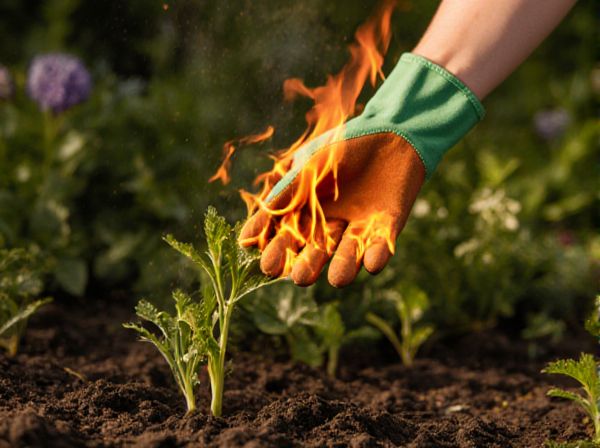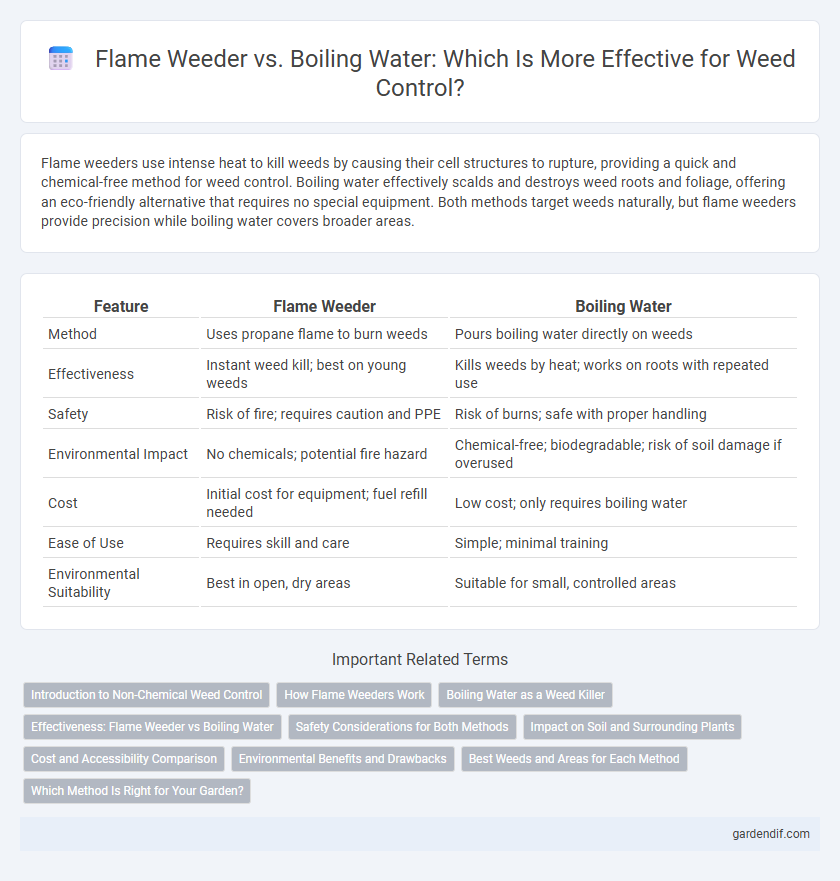
Flame weeder vs boiling water Illustration
Flame weeders use intense heat to kill weeds by causing their cell structures to rupture, providing a quick and chemical-free method for weed control. Boiling water effectively scalds and destroys weed roots and foliage, offering an eco-friendly alternative that requires no special equipment. Both methods target weeds naturally, but flame weeders provide precision while boiling water covers broader areas.
Table of Comparison
| Feature | Flame Weeder | Boiling Water |
|---|---|---|
| Method | Uses propane flame to burn weeds | Pours boiling water directly on weeds |
| Effectiveness | Instant weed kill; best on young weeds | Kills weeds by heat; works on roots with repeated use |
| Safety | Risk of fire; requires caution and PPE | Risk of burns; safe with proper handling |
| Environmental Impact | No chemicals; potential fire hazard | Chemical-free; biodegradable; risk of soil damage if overused |
| Cost | Initial cost for equipment; fuel refill needed | Low cost; only requires boiling water |
| Ease of Use | Requires skill and care | Simple; minimal training |
| Environmental Suitability | Best in open, dry areas | Suitable for small, controlled areas |
Introduction to Non-Chemical Weed Control
Flame weeders effectively eliminate weeds by using intense heat to damage plant cells, causing rapid desiccation without chemicals. Boiling water targets weed roots by scalding underground tissue, leading to plant death through thermal shock. Both methods offer eco-friendly, non-chemical weed control alternatives ideal for organic gardening and reducing herbicide reliance.
How Flame Weeders Work
Flame weeders control weeds by using intense heat to disrupt the plant's cell structure, causing the cells to burst and the weed to wither. The heat is applied briefly, just enough to damage the weed without burning the soil or surrounding plants. Unlike boiling water, which kills roots by scalding, flame weeding relies on rapid heat exposure to effectively eradicate above-ground weed growth.
Boiling Water as a Weed Killer
Boiling water is an effective, chemical-free weed killer that destroys plant cells on contact by causing proteins to coagulate and roots to die from heat damage. Unlike flame weeders which use intense heat and carry a fire risk, boiling water is safer for small areas and ideal for organic gardening. Its immediate impact on weeds and soil-friendly nature make boiling water a practical choice for natural weed control.
Effectiveness: Flame Weeder vs Boiling Water
Flame weeders use intense heat to rapidly burn weed foliage, effectively killing above-ground parts while minimizing soil disturbance. Boiling water penetrates the soil, destroying both the above-ground weeds and their root systems, leading to more comprehensive weed eradication. Studies show boiling water achieves higher long-term weed control, whereas flame weeders are faster but may require repeated applications for persistent weeds.
Safety Considerations for Both Methods
Flame weeders pose risks of burns and fire hazards, requiring careful handling and protective gear for safe use, while boiling water can cause severe skin burns and should be applied cautiously to avoid splashing on plants or soil. Both methods demand awareness of surrounding vegetation and weather conditions to prevent unintended damage or fire spread. Employing safety measures such as wearing gloves, eye protection, and maintaining a controlled environment minimizes health risks and environmental impact.
Impact on Soil and Surrounding Plants
Flame weeders use intense heat to destroy weed tissues, minimizing soil disturbance and preserving beneficial soil microorganisms compared to boiling water, which can alter soil pH and harm both target weeds and nearby plants through thermal shock. Using a flame weeder allows precise targeting of weeds, reducing the risk of damage to desirable plants and maintaining soil structure essential for healthy root systems. Boiling water, while effective for small areas, increases the risk of nutrient leaching and soil compaction due to moisture saturation.
Cost and Accessibility Comparison
Flame weeders generally require an initial investment in a propane tank and burner, which can cost between $50 and $150, but offer long-term usability with simple fuel refills. Boiling water, on the other hand, incurs minimal upfront cost as it only requires a basic kettle or pot, making it highly accessible for most gardeners. While flame weeders provide quicker results and cover larger areas efficiently, boiling water is an inexpensive and eco-friendly method suitable for small-scale weed control.
Environmental Benefits and Drawbacks
Flame weeders utilize intense heat to destroy weed cells without chemical residues, offering a chemical-free alternative that preserves soil microbiota but can increase carbon emissions due to propane use. Boiling water treatments eliminate weeds through thermal shock and leave no pollutants, providing a biodegradable option with minimal impact on non-target organisms; however, repeated applications can lead to soil temperature fluctuations that disrupt beneficial soil fauna. Both methods reduce herbicide reliance, yet flame weeding may pose higher environmental risks from fuel consumption, while boiling water requires careful application to prevent harm to surrounding plants.
Best Weeds and Areas for Each Method
Flame weeders excel in controlling tough, perennial weeds like dandelions and thistles in large, open areas such as driveways and gravel paths, offering a quick and environmentally friendly solution without disturbing soil structure. Boiling water is most effective for small patches of shallow-rooted, annual weeds like chickweed and crabgrass found in garden beds or between patio stones, providing a chemical-free method ideal for homeowners. Selecting the best method depends on weed type, infestation size, and the surrounding landscape to maximize efficiency and minimize collateral damage.
Which Method Is Right for Your Garden?
Flame weeding offers precise control for targeting individual weeds, making it ideal for flower beds and pathways without disturbing desired plants, while boiling water is a cost-effective option that can quickly kill weeds but risks damaging nearby vegetation due to its lack of selectivity. Gardeners seeking an eco-friendly, chemical-free approach should consider the variety of plants present and the size of the area to treat, as flame weeders require caution and practice, whereas boiling water is simple but best suited for small patches or cracks in hard surfaces. Assessing the garden's layout, plant sensitivity, and safety preferences will help determine whether flame weeding's controlled heat or boiling water's straightforward application better fits your weed management needs.
Flame weeder vs boiling water Infographic

 gardendif.com
gardendif.com